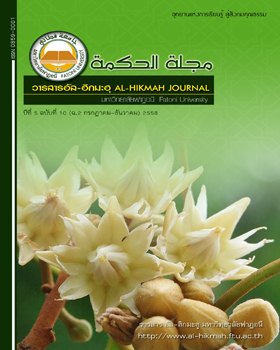Development of a causal relationship model for operations Islamic cooperative in Thailand and test the model invariance between cooperative savings and cooperative service
Keywords:
Causal relationship model, Islamic cooperative in Thailand, Model invarianceAbstract
The Objective of this research were to development of a causal relationship model for operations Islamic cooperative in Thailand and to test the model invariance between cooperative savings and cooperative service, an application of the multiple group structural equation model. The sample in this survey research was 376 Islamic cooperative administrators by stratifies sampling. Data were by questionnaire and analyzed by using Multi-Group Structural Equation Modeling (SEM)
The results indicated that adjusted model fitted well with the empirical data. χ2/df = 2.04, CFI = 0.97, GFI = 0.94, AGFI = 0.91, RMSEA = 0.05, RMR = 0.02 analyzing the causal relationship factors affecting the cooperative management in terms of direct effect by personnel readiness followed by shared values and strategic orientation. Finally, causal factors affecting the cooperative performance in terms of direct effect by personnel readiness followed by strategic orientation and cooperative management and Islamic cooperative in Thailand, cooperative savings and cooperative service indicated invariance of model and parameters. The test for invariance of the relationship model.
References
กรมส่งเสริมสหกรณ์. 2557. ข้อมูลสหกรณ์ ปี 2556. จากอินเตอร์เน็ต.
http://it1.cpd.go.th/profile/report_con_step2.asp (ค้นเมื่อ 24 ธันวาคม 2557)
ก้องเกียรติ บูรณศรี. 2553. “ความสัมพันธ์เชิงสาเหตุระหว่างความเป็นผู้ประกอบการขององค์การ สภาพแวดล้อมทางธุรกิจ และผลการดำเนินงานของสถานประกอบการอุตสาหกรรม”. วิทยานิพนธ์บริหารธุรกิจดุษฎีบัณฑิต สาขาวิชาบริหารธุรกิจ. กรุงเทพฯ: มหาวิทยาลัยธุรกิจบัณฑิตย์
ธานินทร์ ศิลป์จารุ. 2555. การวิจัยและวิเคราะห์ข้อมูลทางสถิติด้วย SPSS และ AMOS. พิมพ์ครั้งที่ 13. กรุงเทพฯ : หจก.สามัญบิสเนสอาร์แอนด์ดี.
มนชยา อุรุยศ. 2553. การศึกษานโยบายเพื่อการพัฒนาการเงินอิสลามของประเทศไทย. รายงายวิจัย , สำนักงานกองทุนสนับสนุนการวิจัย
เยาวภา ปฐมศิริกุล. 2554. “แบบจำลองปัจจัยความสำเร็จการจัดการธุรกิจบริการสุขภาพโรงพยาบาลเอกชนในประเทศไทย”. วารสารบริหารธุรกิจ มหาวิทยาลัยธรรมศาสตร์. 34(130), 14-35
Aktan, B., & Bulut, C. 2008. Financial performance impacts of corporate entrepreneurship in emerging markets: a case of Turkey. European Journal of Economics, Finance and dministrative Sciences, 12, 69-79.
Antoncic, B., & Hisrich, R. D. 2001. Intrapreneurship: Construct refinement and cross-cultural validation. Journal of business venturing, 16(5), 495-527.
Covin, J. G., & Slevin, D. P. 1991. A conceptual model of entrepreneurship as firm behavior.
Fink, M., Harms, R., & Kraus, S. 2008. Cooperative internationalization of SMEs: Self-commitment as a success factor for international entrepreneurship. European Management Journal, 26(6), 429-440.
Fuentes-Fuentes, M., Lloréns-Montes, F. J., Molina-Fernández, L. M., & Albacete-Sáez, C. A. 2011. Environment-quality management coalignment across industrial contexts: An empirical investigation of performance implications. Industrial Marketing Management, 40(5), 730-742.
Hage, J. T. 1999. Organizational innovation and organizational change. Annual Review of Sociology, 597-622.
Lengnick-Hall, C. A., & Lengnick-Hall, M. L. 1988. Strategic human resources management: A review of the literature and a proposed typology. Academy of management Review, 13(3), 454-470.
Lumpkin, G. T., & Dess, G. G. 1996. Clarifying the entrepreneurial orientation construct and linking it to performance. Academy of management Review, 21(1), 135-172.
Marxt, C., & Link, P. 2002. Success factors for cooperative ventures in innovation and production systems. International Journal of Production Economics, 77(3), 219-229.
Mazzarol, T., Limnios, E. M., & Reboud, S. 2013. Co-operatives as a strategic network of small firms: Case studies from Australian and French co-operatives. Journal of Co-operative Organization and
Management, 1(1), 27-40.
Mokaya, S. O. 2012. Corporate Entrepreneurship and Organizational Performance Theoretical Perspectives, Approaches and Outcomes. International Journal of arts and Commerce, 1(4), 133-143.
Nair, A. 2006. Meta-analysis of the relationship between quality management practices and firm performance implications for quality management theory development. Journal of Operations Management, 24(6), 948-975.
Nilsson, J. 2001. Organisational principles for co-operative firms. Scandinavian journal of management, 17(3), 329-356.
Penuel, B., Roschelle, J., & Cohen, A. L. 1999. Designing learning: cognitive science principles for the innovative organization. Menlo Park, CA: Center for Technology in Learning. SRI International.
Pesamaa, O., Eriksson, P. E., & Hair, J. F. 2009. Validating a model of cooperative procurement in the construction industry. International Journal of Project Management, 27(6), 552-559.
Russell, R. D., & Russell, C. J. 1992. An examination of the effects of organizational norms, organizational structure, and environmental uncertainty on entrepreneurial strategy. Journal of Management, 18(4), 639-656.
Susanty, A., Handayani, N. U., & Henrawan, M. Y. 2012. Key Success Factors that Influence Knowledge Transfer Effectiveness: A Case Study of Garment Sentra at Kabupaten Sragen. Procedia
Economics and Finance, 4, 23-32.
Wright, P. M., & McMahan, G. C. 1992. Theoretical perspectives for strategic human resource management. Journal of management, 18(2), 295-320.
Xie, X. 2012. Cooperative Factors, Cooperative Innovation Effect and Innovation Performance for Chinese Firms: an Empirical Study. Physics Procedia, 24, 1086-1091.
Zeng, S. X., Meng, X. H., Zeng, R. C., Tam, C. M., Tam, V. W., & Jin, T. 2011. How environmental management driving forces affect environmental and economic performance of SMEs: a study in the
Northern China district. Journal of Cleaner Production, 19(13), 1426-1437.



